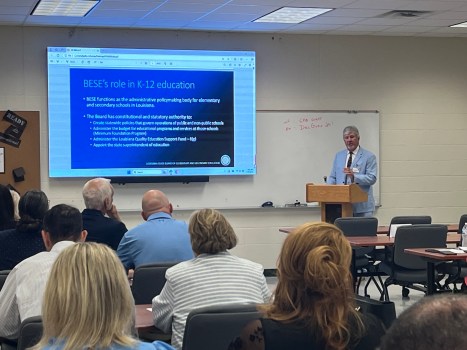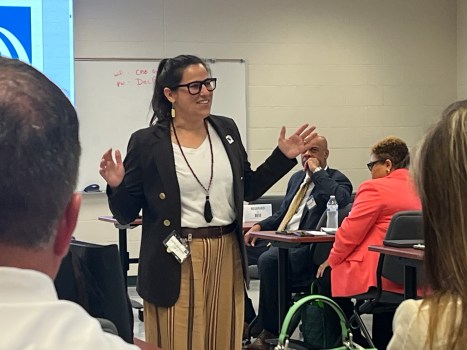Classroom-to-career connections ‘bridging success’ across state
Published 5:56 pm Wednesday, April 30, 2025
Classroom-to-career connections was the theme Wednesday of the Board of Elementary and Secondary Education’s Bridging Success workshop at the College Street Vocational Center.
The purpose of the workshop was to engage in productive conversations with the community in the hopes of expanding work-based learning experiences for high school students and how that translates into future, meaningful workforce development opportunities, said BESE Executive Director Tavares Walker.
In attendance were representatives of U.S. Sen. John Kennedy’s and Speaker Mike Johnson’s offices, industry, small and large business owners, Calcasieu Parish School Board, McNeese State University, Sowela Technical Community College, Southwest Louisiana Economic Development Alliance, Workforce Investment Council and the Louisiana Workforce Commission.
CPSB Superintendent Jason VanMetre said the vocational center offers “tremendous” opportunities for local students and is “one of the shining stars in our parish.”
“We have opportunities here for hands-on education and for excitement,” VanMetre said. “Opportunity is what we want for every kid and this is a good place to have it.”
District 7 BESE member Kevin Berken said Louisiana has developed a framework of two pathways for high school students — a university pathway and the career pathway.
“In the university pathway, the goal is for students to graduate from high school prepared for university, community college or technical college programming without the need for remediation or prerequisite support,” Berken said. “Students taking the career pathway will graduate prepared for employment with skills required for entry into career pathways.”
Key components for these students is access to a high-quality learning-based experience and apprenticeships or internships, Berken said.
Louisiana Department of Education Deputy Assistant Superintendent Jessica Vallelungo said the state is in a paradigm shift when it comes to career and technical education.
“We have amazing career and technical education programs across the state, especially in Calcasieu Parish,” she said. “What we need to see ourselves as is a valuable component of the workforce development pipeline. We have great LCTCS campuses, great four-year institutions, but we can put kids in the workforce — students that want to move directly from high school into work can get the technical skills that they need in our classrooms to move into jobs ready to be good employees.”
Vallelungo said work-based learning is a classroom experience as well as a work experience. The students spend 106 hours — half of the time in a classroom, the other half at a job site — learning soft and technical skills. They spend part of the day at the job site, then the other half of the day in the classroom where what they learned at the job site is reinforced.
“It’s a high-dosage engagement with an employer,” she said. “And it gives employers access to the next generation of talent.”
Kaffia Arvie, executive director of the Workforce Investment Council, said the organization has compiled a list of approved, recognized industry-based certifications available in the state that students can also earn. An IBC is a credential, usually issued by an industry or industry group, that verifies an individual has met the skill standards established by that industry as minimal requirements to successfully enter the workforce and compete in a particular occupational area.
“Bundles” of IBCs for a single student are also available in which they can earn multiple credentials toward their chosen career path.







